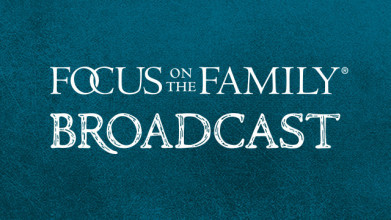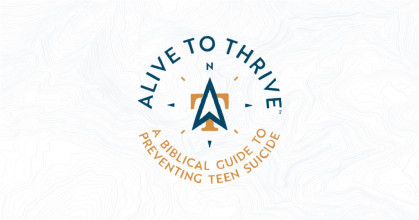Dr. Kathryn Butler: So he had this recovery that was totally against all probability. And in medicine, we say, “Oh, it was an outlier,” and we’re just grateful that it happened even if we don’t understand it.
Jim: Sure.
Kathryn: But I couldn’t ignore the fact that this had occurred in response to his wife’s prayer.
John Fuller: That’s Kathryn Butler describing how God shows up even when you experience sickness and pain and suffering in your life. This is Focus on the Family with Jim Daly, and, uh, thanks for joining us. I’m John Fuller.
Jim Daly: Well, today, we are gonna talk about suffering. It’s not a light subject. It’s probably not a subject that you want to talk about in our modern culture. We want happy, joyful, kind of superficial discussions. But it is important to understand that suffering is a part of this life, that God is with us in that, and sometimes it doesn’t feel that way. And we have a wonderful guest who’s gonna walk us through her journey of doubt and reaffirmation in her faith. And I think it will carry a lot of weight for you. You know, Jesus said in the sermon on the mount, “Blessed are those who mourn, for they shall be comforted.” Um, he also told his followers that he would never leave us or forsake us. But I know for some of you listening and viewing right now, you’re going, “I used to think that, but I’m not sure where I’m at today.” This program’s gonna be for you.
John: Mm-hmm. And Dr. Kathryn Butler joins us. Uh, she was trained in surgery and critical care at Massachusetts General Hospital and Harvard Medical School. And, uh, she now writes for desiringgod.org in The Gospel Coalition about, uh, topics like faith and medicine, um, and shepherding kids in the gospel. Uh, Katie has written a terrific book, and, uh, it captures her heart, uh, God’s heart. It’s called Glimmers of Grace: A Doctor’s Reflections on Faith, Suffering, and the Goodness of God. Look for a copy of that book at focusonthefamily.com/broadcast. And be aware that, uh, some of the stories and situations we’re sharing about today are for mature listeners and kind of tough to hear. So keep that in mind as we begin.
Jim: Kathryn, welcome back to Focus.
Kathryn: Thank you so much, Jim and John. It’s a joy to be here.
Jim: And I know you go by Katie.
Kathryn: Yeah.
Jim: It’s just hard to talk to a doctor like that, Katie. It’s just-
Kathryn: I’m sorry. I feel like I’m in trouble when I’m called Kathryn. (laughs)
Jim: Something in me. Yeah, Kathryn step over here.
Kathryn: Exactly. (laughs)
Jim: Kathryn. Um, as you got into the medical field, what was your faith experience like? I mean, sometimes you could be so heavy into science that you can forget about God, that it seems like it’s all right here, materialistic.
Kathryn: Yeah. Well, my, my journey actually to being a believer was through my work. And God brought me to a place that was very, very low, uh, through witnessing all the suffering that my patients were enduring.
Jim: Hm.
Kathryn: But he also brought me to himself through the suffering that I then endured as a result. And it’s the whole impetus actually for me. Writing this book is to try to help people who are suffering through illness be able to see God’s goodness.
Jim: Well, and I so appreciate that because you were, I would use the word, unnaturally inundated with suffering as a doctor. It’s almost like you saw too much of it.
Kathryn: Yeah. And I did not have any kind of bedrock of strong faith. I didn’t grow up in the church. We… I… Christmas and Santa Claus were center stage for me-
Jim: Yeah.
Kathryn: … in ch- in terms of Christianity. I had no concept of the gospel, never read the bible. I believed in God and I would pray, but I didn’t know to whom. And I certainly didn’t have any sense of the fact that I was a sinner who needed to be saved. I thought that being a Christian meant being a good person-
Jim: Yeah.
Kathryn: … which is clearly not the case. Uh, and then it was one night in the emergency room about halfway through my surgical training where I came face-to-face with suffering in a very raw and deep way.
Jim: What happened?
Kathryn: I was… So I had this position, uh, halfway through my residency where I worked in the emergency room for 24 hours, and I’d go home for 24 hours back and forth. And during that 24-hour period, it was our job to manage everything surgical that came into the ER. So things as mundane as having a little laceration on your hand to ruptured aortic aneurysms. It was my job to figure out what to do and stabilize the patient so that the attending physicians could take care of them. And I loved it, because I loved the opportunity to come a- alongside people when they were their most vulnerable-
Jim: Yeah.
Kathryn: … in mo- in most need of help. That to me was incredibly gratifying even though I wasn’t a believer yet. There was something, uh, um, a spirit of service that really resonated.
Jim: Yeah.
Kathryn: However, there was one night where I had three young men who came in that I couldn’t save, and it really confronted me with the problem of evil. So I had one 20 or 22-year-old gentleman who came in after having been assaulted in his bed with a baseball bat. His wife died during the assault. His four-year-old son witnessed everything. And he came in hemorrhaging into his brain, bleeding into his brain. And he was on the verge of dying, and so I was scrambling to try to stabilize him so that the neuro- neurosurgeons could take him to the operating room. And all I could think about in the back of my mind as I’m trying to focus on placing a central line which is a big line that goes into the veins underneath your collar bone, was what is this little boy gonna do, how is he gonna cope, what kind of life is he gonna have after he just witnessed his parents be murdered in front of him. And as I was still reeling from that, my pager went off again. Another 15-year-old shot in the head this time. And when he came in, his pupils were fixed and dilated because he was brain-dead.
Jim: Yeah.
Kathryn: There was nothing that we could do. And so I said, “What can I do in this scenario? What p- what could I possibly do to help?” And the only thing I could think of was let me clean him up so that when the family comes in, they see some semblance of the boy that they love. And so I started to clean up the wound and to stitch it closed. And some well-meaning, but unknowing staff member brought his mom into the room while I was working.
Jim: Oh.
Kathryn: And she just started howling and crumpled to the ground in grief. And I just tugged off my gloves and threw them away and ran from the room and hid the bathroom for a little while to cry, but then had to work another 12-hours.
Jim: Yeah.
Kathryn: And the whole time when I was on my shift, I just kept thinking I didn’t know much about God, but how could a God, if he was good, which is what I’d always assumed, allow this kind of thing to happen. And, and the grief was so profound that the next morning, even though I should have gone home since I was up for 30 hours, I felt like something vital had just been torn from me.
Jim: Wow.
Kathryn: And I drove 100 miles into the Berkshire Mountains to try to connect with something good and something true.
Jim: Some calm.
Kathryn: Exactly. And just-
Jim: Yeah.
Kathryn: And it was one of those beautiful October days in New England. I don’t know if you’ve ever witnessed them where it just… I was driving through the mountains and it was like the trees were lit of fire. And I pulled onto a bridge over the Connecticut River, and the bridge was a mirror for the sky. It was just-
Jim: Huh.
Kathryn: Like, God’s artistry was all around me. Like, the fingerprints of the fact that he’s a creator and he’s good were all around me, but I had no basis to understand any of it ’cause I’d never read the bible.
Jim: Yeah.
Kathryn: And so I held onto the railing and tried to pray, but not having scripture in my heart, I had no words. And I decided I couldn’t pray because he didn’t exist. And so I walked away from that bridge convinced there was no God. And then for the next year was agnostic. And in the setting of that agnosticism, had the worst depressive episode of my life, because if there’s no God, what’s the purpose to anything?
Jim: Right.
Kathryn: What hope do we have? And to the point where I kept repeatedly imaging going back to that bridge and just throwing myself over.
Jim: Yeah.
Kathryn: And the only thing that stayed me from doing that by God’s kindness was my husband, that I had a husband who loved me, and I knew he would be heartbroken.
Jim: I mean, this is really despair.
Kathryn: It was.
Jim: I mean, you’re-
Kathryn: It was.
Jim: … in your point of deep despair.
Kathryn: I was, I was because-
Jim: And in that, the elements of that had to be you couldn’t do enough.
Kathryn: Right, exactly.
Jim: I mean, here you are given to saving life.
Kathryn: Exactly. And you realize that we are finite and fallen-
Jim: Yeah.
Kathryn: … is what we know now, as Christians, that we’re limited and we’re fallen in sin, and only God can truly save. And I… But I didn’t have any framework conditioning.
Jim: Yeah. And, and we’re gonna unfold this over the next few minutes, but you also had another patient. I think his name’s David who often struggle with, uh, remaining in faith.
Kathryn: Yes.
Jim: And you had some great discussions with him. What did he say, and how did he… How did you relate to the difficulty of understanding the goodness of God together?
Kathryn: Oh, yeah. So I mean, my situation was I didn’t have an understanding of the bible. But David was a disciple of Christ through and through.
Jim: And he’s a patient.
Kathryn: He was… Yes, he was a patient who was my dear friend. So, so-
Jim: It’s rare for a patient to teach a doctor something.
Kathryn: Oh, he taught me more about suffering and faith in the hospital setting than any of my actual patients that I cared for. This was just a dear friend whom I happened to walk alongside-
Jim: Hm.
Kathryn: … toward the end of his life through illness.
Jim: Wow.
Kathryn: And his story… His whole life was an overflow of gratitude for Christ.
Jim: Huh.
Kathryn: He… His background was that he actually struggled with drug abuse for many years, and spent 10 years homeless on the streets of New York-
Jim: Hm.
Kathryn: … just looking for the next high. Tried to commit suicide once. And he sees it as God’s grace toward him, a good Samaritan saw what he tried to do, and in his words, treated him like the image bearer he was, packed with potential and deserving of love is what he would always say.
Jim: Ah.
Kathryn: And intervened and spoke to him softly and got him to the ER. And after that point, he, David, turns things around by God’s grace.
Jim: Wow.
Kathryn: He com- devoted himself to Christ, and then he lived his life constantly talking about God’s goodness. And he wa- just an overflow of love for Christ.
Jim: Yeah. Made an impression on you, obviously.
Kathryn: Yes, yes. And so it was all-the-more upsetting to me when then he started to go into the end-stages of emphysema, to see his faith start to become shaky.
Jim: Ah.
Kathryn: And the things that he loved… We watched… The things that he loves in terms c- teaching Sunday school and running a small group, and tending a memorial garden for our HIV patients crumbled away because he became tethered to an oxygen tank and couldn’t participate in the things that instilled life and meaning. And in the setting of all this, I visited him once in rehab center. And he just looked bereft. And he said, “I’m just really scared.” And I thought, you know, “Are you scared of what’s coming or are you scared of dying?” He says, “I just hope that I’m gonna be with Jesus. I hope I’m going to Heaven and that God forgives me.”
Jim: Wow.
Kathryn: He wasn’t sure all of a sudden whether or not he was saved. And I held his hand, I said, “David, you know, like, you placed your faith in Christ. You know you’re going to be with him, right?” And he just said, “I’m just so sorry for the things I’ve done.”
Jim: Yeah.
Kathryn: And so this was someone who knew the bible, knew scripture, but the strains and the toils of illness momentarily clouded his vision of what he knew the truth to be.
Jim: Yeah.
Kathryn: And I think times in the hospital do this.
Jim: Absolutely. And I want… I, I think I need for the listeners to come back a moment. So you had this wilderness experience, the bridge experience, even thinking of taking your own life, and your husband’s role in helping you out of that darkness.
Kathryn: Yeah.
Jim: W- where did you reconnect with the Lord? What were you-
Kathryn: Yeah. So for about a year of feeling like I was going through the motions, and living really felt like dying, like, I had no connection to anything, I was working in the intensive care unit. And I was caring for this one gentleman who had suffered severe brain injury after having arrested. And he had CPR for about half an hour, which is a very long time. I mean, it’s very common in that setting that you have so little oxygen to your brain that you suffer injury afterwards. And his was severe enough that he was in a coma. And the neurologist didn’t think that he would progress beyond maybe opening his eyes and tracking. That’s the best that they thought he would be able to do.
Jim: Mm-hmm.
Kathryn: And it was heartbreaking ’cause his family was clinging to any sign that he would recover. And I, I’d go by, and they’d say, “Dr. Katie, has anything changed?” And every time they’d ask me, I’d want to cry and say, “No. Like, he’s not gonna get better.” And in the setting of this, his wife one day… He loved cheesy ’80s tunes. (laughs) And he, he-
Jim: Cheesy ’80 tunes.
Kathryn: And ’80s tunes.
Jim: I might like some of those, too.
Kathryn: Tiffany, Debbie Gibson, and they-
Jim: Uh, no.
Kathryn: … and [inaudible] (laughs).
Jim: (laughs)
Kathryn: Not hair metal (laughs).
Jim: Okay, yeah.
Kathryn: And they used to sing them to each other, like, when-
Jim: (laughs)
Kathryn: … they were dating.
Jim: Even worse.
Kathryn: Yeah. And so one day, I’m, I’m in the ICU, and I hear one of these songs being belted from his room. And I run in, and his wife all of a sudden is wearing a cross, and she’s hung another one about the size of an avocado over his bed.
Jim: Oh, wow.
Kathryn: And she said, “I woke up this morning and God told me he’s gonna be fine.” And I, I looked at her, and I, again, my heart was breaking because, number one, I didn’t believe in this God that she was talking about, and number two, everything pointed to that he was not gonna be fine.
Jim: Right.
Kathryn: And then later that day, his family calls me to the bedside, “Dr. Butler, Dr. Butler.” I come in, and they say, “He moved his toe when we asked.” And I just… I’m s- like, “I’m so sorry. Like, this is probably a reflex. We see this all the time.” And I yell in his ear and call his name and say, “Move your toe,” he didn’t listen to me. His wife yells in, uh, his name and says, “Move your toe,” and he does. And I say, “Okay. I, I hope it means something,” but inwardly, of course I did know it doesn’t.
Jim: Right.
Kathryn: The next day, he opened his eyes and looked at her. The day after that, he started to move his hands to command. Two weeks later, he was fully awake, fully communicative, pointing at his feeding tube asking for filet mignon.
Jim: (laughs)
Kathryn: So he had this recovery that was totally against all probability. And in medicine, we say, “Oh, it was an outlier,” and we’re just grateful that it happened even if we don’t understand it.
Jim: Sure.
Kathryn: But I couldn’t ignore the fact that this had occurred in response to his wife’s prayer. And I’m ashamed to say that even though that prayer had been in Jesus’s name, although it alerted me to the truth that there is something beyond all our protocols and our science and what we can do, something more powerful than we could comprehend. I studied other religions, so I studied the Bhagavad Gita, and I studied the Quran, and I studied Buddhism, but found in every case that there was not an answer for sin, meaning that sin was something, even though I didn’t have language for it, that I knew existed-
Jim: Right.
Kathryn: … ’cause of everything I’d seen.
Jim: Right.
Kathryn: That no matter what station of life you’re in, eventually you’ll come in through the double doors, and calamity, and wickedness is just part of the human heart. And I thought, “If it’s up to us to save us from this, we’re doomed.”
Jim: Yeah.
Kathryn: And my husband intreated me, “Please, read the bible. Please, just read the gospels.”
Jim: Where was he at spiritually?
Kathryn: He actually had also not been a believer until about the year before.
Jim: Wow.
Kathryn: And it was another instance of God working through a very dark time in his life to bring him to Christ. And so he had been, for about a year, attending church regularly and said, “Please just read the gospels and read Romans.” So I came home after work one day, and normally should have gone to sleep ’cause it was post-call, but I took his advice. And I had a bible from high school that I’d never read, pulled it off the shelf, wiped off the dust, cracked the spine, and I read the gospel, gospels, and I read Romans. When I got to Romans 5, I burst into tears.
Jim: Hm.
Kathryn: Not only because it showed us that through Christ, we can actually rejoice in our sufferings because our hope in Christ endures, but the line that, that did it for me was Romans 5:8 where it says God shows his love for us in that, while we were still sinners, Christ died for us, meaning that Jesus came precisely because of the suffering that we’re enduring, and that he knows what it’s like. He’s endured the physical pain, he’s endured the feeling of being cut off from God there on the cross. And God loves us so much that he put his son through this so that when he returns, all things will be made new.
Jim: Hm.
Kathryn: And he’ll wipe away every tear from every eye, and the suffering and the death that we so hate now will be no more.
Jim: Hm.
Kathryn: And so it really was, uh, remarkable and, and just an example that God can work through our suffering to bring us to himself. And then no matter what we’re going through, we can cleave to the hope and the promise that Jesus will make all things new.
Jim: So true.
John: Hm. This is Focus on the Family with Jim Daly, and our guest today is Katie Butler. And she’s written a book capturing, uh, the heart and the emotion you’re hearing right there. Uh, it’s called Glimmers of Grace: A Doctor’s Reflections on Faith, Suffering, and the Goodness of God. Uh, get a copy of that book and find additional resources at focusonthefamily.com/broadcast.
Jim: Katie, there’s so much in what you’re saying where people are living.
Kathryn: Mm-hmm.
Jim: You know, they, they kind of have come to the end of their rope-
Kathryn: Mm-hmm.
Jim: … when it comes to, “Where are you, God?”
Kathryn: Mm-hmm.
Jim: And the point is that’s okay.
Kathryn: Mm-hmm.
Jim: God can manage that. You know, sometimes, we feel embarrassed that we’re posturing ourselves that way, especially as believers-
Kathryn: Yeah.
Jim: … ’cause we don’t understand, like your friend, David, who did such a great job until-
Kathryn: Right.
Jim: … his world was rocking, right?
Kathryn: Right, right.
Jim: And then, Lord, have I not done it well enough for you? It’s a fairly common believer problem that we have. Like, we’re good as long as our health is with us, and-
John: Mm-hmm.
Jim: … you know, the family’s doing well. But when things rock our boat-
Kathryn: Mm-hmm.
Jim: … uh, we tend or can go to doubt-
Kathryn: Mm-hmm.
Jim: … ’cause Lord, you said if we love you, we’re gonna have all these blessings and things. And I so love the fact how you, that scripture fit-
Kathryn: Mm-hmm.
Jim: … what you were thirsting for.
Kathryn: Mm-hmm.
Jim: That’s how I feel.
Kathryn: Yes.
Jim: You know, it was exactly there, the, yet when we were sinners, Christ died for us-
Kathryn: Right, yeah.
Jim: … ’cause of our suffering. And he… I mean, it’s, it’s the right antidote.
Kathryn: Yup.
Jim: It’s boom, this is it. And this is what makes Christianity so powerful.
Kathryn: Mm-hmm.
Jim: It’s God reaching down to us, not us trying to work our way into salvation-
Kathryn: Right.
Jim: … which is really those other religions.
Kathryn: Yeah, yeah.
Jim: It’s just true.
Kathryn: Right, right.
Jim: Don’t mean any disrespect to that, but you’re not gonna work your way into this.
Kathryn: Mm-hmm.
Jim: And God gives it to us as a gift.
Kathryn: Mm-hmm.
Jim: Uh, how have you learned that the Lord’s faithfulness abounds even when you see the effect of sin in this world?
Kathryn: Oh, my goodness, yeah. I think… And this is why I think remaining in the word is so crucial, because when you’re confronted with these things in real time, it can be very easy to fall into despair. And this is where I think the body of Christ is so critical to remind us when we can’t see for ourselves the truth of who God is. So I, I… What happens is when you’re in the word and you realize that God provides and that he’s merciful, and that our circumstances don’t change that, and when you cleave to what Jesus has done for us, then you start to see glimmers of his work even when you see calamity. And so you see these moments where-
Jim: Hm.
Kathryn: … yes, death is the enemy, and it’s abhorrent. It’s never what we were meant for. But God still provides in beautiful ways that become more apparent when you realize that he’s good and he’s merciful.
Jim: Boy, when you say that it’s not what we were-
Kathryn: No.
Jim: … meant for-
Kathryn: No.
Jim: … that lines up with scripture truth-
Kathryn: Yup.
Jim: … also because that, uh-
Kathryn: Right.
Jim: … we were created for everlasting life, right?
Kathryn: Right, right.
Jim: Okay, let me, let me ask you a couple of questions that seems to be dominant in this area of suffering, like back to where you were years ago.
Kathryn: Mm-hmm.
Jim: If, if God is real, if God is there, how, how can he allow children to suffer?
Kathryn: Hm.
Jim: I think it’s the number one question about people who doubt the existence of God-
Kathryn: Yeah.
Jim: … because if God were real-
Kathryn: Right.
Jim: … and he’s a good God-
Kathryn: Right.
Jim: … he would not allow a child to suffer, die of cancer-
Kathryn: Yeah.
Jim: … leukemia-
Kathryn: Right.
Jim: … whatever it might be.
Kathryn: Right.
Jim: H- h- what kind of answer would you give that person, the skeptic or the agnostic kind of doubting?
Kathryn: Yeah. I think responding to these kinds of questions, it’s really important not to have an, a response that’s a platitude, to make light of it, or… I don’t think you can tie it up neatly in a bow.
Jim: It’s a serious question.
Kathryn: And I don’t think we can know for sure why in any particular case something like this happens. We know that it’s sin, we know that God can work through these kinds of events and this suffering for good, even if we don’t see what it is. I think about John 11 a lot where Jesus’s friend, Laz- Lazarus is dying, and this apostle say to him, “You know, aren’t you gonna go and help him?” And he stays, and he delays. And that’s inconceivable to them. “Why aren’t you going to help Lazarus,” right? And he arrives after Lazarus has already died, and Martha has the same response, “Lord, if you’d only been here, he would have lived,” right? And then what you see is that Jesus, in the presence of all these onlookers and mourners, raises Lazarus from the dead so that they all see that he’s the Christ and place their faith in him.
Jim: Yeah.
Kathryn: And it doesn’t create any easy answers, but it shows that, oftentimes, there’s something beyond what we can see, and we can trust at least that God’s still in the setting of suffering and the setting of heartbreak, and sin, and fallenness, which is something like that is; it’s wrong. It’s not what we were meant for, but he still can engage with it for good.
Jim: You know, I never thought of it quite this way, but was that an illustration of everlasting life that God was trying to show us? You know, h- bringing Lazarus-
Kathryn: Yeah, right.
Jim: … back, he, he had to die again, obviously.
Kathryn: Right.
Jim: But was it the Lord’s way to say, “Death does-
Kathryn: Is not the end through Jesus.
Jim: And it doesn’t a s- the sting.
Kathryn: Right, right.
Jim: I mean, I think perspective plays into this. If we knew what God knew-
Kathryn: Right.
Jim: … about the fact that death is the end of this, but the beginning of eternity with him-
Kathryn: Yeah, right.
Jim: … we might have a different attitude, right?
Kathryn: Mm-hmm, mm-hmm.
Jim: Like, it almost feels like death for the Lord is not that big a deal. It sounds… I’m not trying to be disrespectful, but man, he-
Kathryn: In the eternal viewpoint-
Jim: Right. And if we had more of that perspective-
Kathryn: Right.
Jim: … a better understanding of the first step of eternity is this-
Kathryn: Right.
Jim: … transition-
Kathryn: Right.
Jim: … this death in this life to eternal life.
Kathryn: Right.
Jim: Maybe that’s the difference, and that’s why we perceive that God doesn’t care, seemingly.
Kathryn: Mm-hmm.
Jim: But he does.
Kathryn: He’s got the, the broad view.
Jim: But he’s got the big picture.
Kathryn: Yeah.
Jim: He knows what is next.
Kathryn: And yet, Jesus wept-
Jim: Yeah.
Kathryn: … when Lazarus died.
Jim: Hm.
Kathryn: So there’s still grief on the part of our savior-
Jim: Yeah.
Kathryn: … in the face of death. He came to save us from it, but he weeps in the face of it, which should give some comfort that, no, this, it’s okay to cry. The first thing Job does when he loses all that he cares about, he weeps, and then he praises God.
Jim: Yeah.
Kathryn: And those things, they might seem their intention, but the bible tells us they’re not.
Jim: Well, again, I just feel that you are quite an eyewitness expert given all of the sadness and all of the suffering that you’ve seen as a physician. Let’s end here for that person who’s been though, um, you know, severe trial, whatever it might be, but it’s rocked them.
Kathryn: Mm-hmm.
Jim: You know, they don’t know, God are you s- are you really there?
Kathryn: Mm-hmm.
Jim: Um, it’s shaken their faith. How would you encourage them today, the person listening maybe again, dozens or hundreds, who knows?
Kathryn: Yeah, yeah. I would point I think to Hebrews 4 where it says we don’t have a high priest who can’t sympathize with us in our weakness. And to know that Jesus sees your suffering, and Jesus knows and has walked through that kind of agony, and he bore it for us. And I think looking to Revelation, the truth and the promise that he will return and that he bore all this so that when he returns, he’ll make all things new, and this will be no more, and that he will give us everlasting life and wipe away every tear from every eye.
Jim: Yeah. And speaking of not giving platitudes, the reality is God’s ways are above our ways.
Kathryn: Mm-hmm.
Jim: We don’t understand these things, the impact, the ripple. I wondered if Heaven, at least in part, is gonna be the connection of all those dots-
Kathryn: Mm-hmm, yeah.
Jim: … that we see the amazing, uh, symmetry that God creates about why things happen in this life and who-
Kathryn: Mm-hmm.
Jim: … someone you may not have even encountered-
Kathryn: Mm-hmm.
Jim: … knew something about something you did-
Kathryn: Yup.
Jim: … that changed their life. Obviously, the patients you engage.
Kathryn: Um, David, when he was in that dark place, God showed him who he was to bring him back.
Jim: Hm.
Kathryn: So he called me several weeks after this, uh, moment of doubt that he had, and he said… He had this one lucid moment after being very delirious and confused for a long time. And he said, “Katie, I’m gonna be okay,” and he didn’t mean physically.
Jim: Right.
Kathryn: He meant, “I know where I’m going.”
Jim: Hm.
Kathryn: And I said, “What happened?” And he said, “I woke up,” he’s like, “and God showed me the scene from Isaiah 6.” And it’s that scene where the hem, just the hem of God’s robe fills the temple. And Isaiah responds with terror, “Whoa, I’m a man of unclean lips. I’m undone.” But David, knowing that he was saved in Christ, looked at that and said, “God is so great, so much greater than any of us realizes, and he’s so near.” And that carried him through hospice and the end of his life, that comfort to know that God was so much bigger than anything he had ever conceived.
Jim: Yeah. And one thing for those of us who are generally healthy and doing okay, is think about it.
Kathryn: Mm-hmm.
Jim: So then when we’re not-
Kathryn: Yeah.
Jim: … we don’t lose hope or faith in Christ, that it emboldens us for the next step like David, your friend.
Kathryn: Yup.
Jim: This has been so good, Dr. Butler. (laughs)
Kathryn: (laughs)
Jim: I love it. And you’re not in trouble.
Kathryn: Okay, thank you.
Jim: Yeah, Katie. Thank you for expressing these things in this wonderful book, Glimmers of Grace. Uh, what a great resource for people who are doubting, people that are perhaps leaning into hopelessness. This is the exact resource that you need. And, uh, man, uh, get in touch with us. Call us. Uh, we will get this book into your hands. If you can make a donation for any amount, we’ll send it as our way of saying thank you. If you can’t afford it, we’re a Christian ministry. We’ll get it to you and trust others will cover the cost of that. The biggest point here is don’t remain in that hopelessness. Find resources that will help you. You’ve heard from someone who was thinking of ending her life because of her despair. It doesn’t get any more real than that. And, um, I’m so glad that God’s given you a testimony not just to help yourself, but to help so many others. Thank you.
Kathryn: Thank you.
John: Mm-hmm. And do get in touch if we can be of help. Um, we have caring Christian counselors here who can walk through, uh, your despair, or if you’re up against some other, uh, significant life event or, uh, distress. Our number’s 800, the letter A, and the word FAMILY. You can also use that number to, uh, make a donation and to get a copy of Glimmers of Grace: A Doctor’s Reflections on Faith, Suffering, and the Goodness of God. And, uh, that’s the book Katie has written. You can order it at focusonthefamily.com/broadcast. On behalf of the entire team, thanks for joining us today for Focus on the Family with Jim Daly. I’m John Fuller inviting you back as we once again help you and your family thrive in Christ.




















